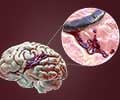Advanced wearable sensors can detect early signs of brain disorders through eye movements, offering a non-invasive solution for monitoring brain health.

Improving Eye Tracking to Assess Brain Disorders
Go to source).
By tracking eye movements, the technology not only enhances early diagnosis but also helps monitor the effects of physical and mental stress on the brain, offering detailed information for more effective management of brain disorders.
‘New eye sensors are easy to wear and can be used in brain-eye relationship studies to monitor the brain’s function. #eyesensors #braindisorders #brain_eye #medindia’





Advertisement
Piezoelectric Sensors for Enhanced Eye Movement Tracking
Researchers say current eye-tracking systems have flaws and deliver insufficient amounts of data. Additionally, they’re bulky, with multiple electrodes on the face and neck, expensive, and have weak outputs.The new method, developed in the UH lab of Jae-Hyun Ryou, associate professor of mechanical engineering, with assistance from Nam-In Kim, post-doctoral researcher, is non-invasive, comfortably wearable, and safe, enabling easy and continuous measurements and monitoring of eyeball movements when combined with a hand-held display and computing device.
The new sensors are sleek and flexible, made from very thin, crystal-like film that generates electricity when it bends or moves. That’s a phenomenon called the piezoelectric effect, and it allows certain materials to generate an electric charge in response to applied mechanical stress.
The output voltages from upper, mid, and lower sensors, or transducers, on different temple areas, generate discernible patterns of voltage.
Advertisement
Early Diagnosis of Brain Disorders Using Eye Sensors
“Skin-attachable wearable sensors for monitoring vital signs and biomedical parameters, are components of great importance in personal healthcare and portable diagnostic systems,” reports Ryou in Advanced Healthcare Materials.“Among them, thin-film piezoelectric sensors offer unique advantages of easy fabrication at low cost, a wide range of available sizes, lightweight, excellent mechanical flexibility and stability, rapid reaction rate, high sensitivity, high signal-to-noise ratio, and excellent long-term stability and durability.”
Applications in ADHD, Autism, and Brain Disorder Research
Ophthalmological assessments of eye blinking patterns have been used for early diagnosis of disorders such as stroke, multiple sclerosis, Parkinson's disease, and Alzheimer's disease. Also, ocular movements are strongly linked to various brain disorders, as eyeball and upper eyelid controls are affected by brain function.In former studies, aberrant blink rate and blink modulation were measured in children with attention-deficit hyperactivity disorder with the spontaneous blink being a measure of the integrity of the dopaminergic system in the brain. Motor neurons in the brain, which relate to eyes and their muscle, have also been associated with autism.
“We believe that the F-PEMSA can be employed in many clinical studies concerning brain disorder conditions such as ADHD, autism, Alzheimer’s disease, and Parkinson’s disease as well as the aftermath of traumatic brain injuries like post-concussion syndrome and post-traumatic stress disorder, potentially offering the prospect of early and accurate diagnoses and the development of personalized therapies,” said Ryou.
Reference:
- Improving Eye Tracking to Assess Brain Disorders - (https:uh.edu/news-events/stories/2024/september/09162024-ryou-wearable-eye-sensors.php)
Source-Eurekalert















